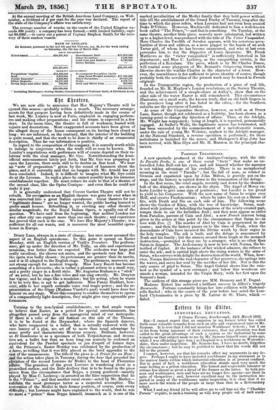Turning to the non-lyrical establishments, we find ample reason to
believe that Easter, as a period for special entertainments, has altogether passed away from the managerial mind of our metropolis. If there is a relic of the old festival on this side of the Thames, it is to be found at the Haymarket; where the Spanish dancers, who have reappeared in a ballet, that is actually endowed with the rare luxury of a plot, are set off to more than usual advantage by some pretty and characteristic Mexican scenery. Brilliant, however, as El Gambusino is as a specimen of both Terpsichorean and decora- tive art, a ballet less than an hour long can scarcely be reckoned an equivalent for the Paschal spectacle orjeu d'esprit of former days. At the Princess's, Easter Monday was celebrated by the production of a farce, so trifling that it was fitly placed as the brief appendix to the rest of the amusements. The title of the piece is A Prince for an Hour ; and the action takes place in Tuscany, during the hour that preceded the elevation of the second Lorenzo de' Medici to the head of Florentine affairs. The grandson of the great Lorenzo is wandering about as a proscribed outlaw, and the little drollery that is to be found in the piece arises from the circumstance that Beppo, a young goatherd—smartly played by Miss C. Leclercq—is arrested on the false supposition that he is the " Prince " ; and that another rural swain—acted by Mr. Harley exhibits exhibits_ the most grotesque terror as a suspected accomplice. The restoration of the Medici to their former position, of course, ends every difficulty ; but Lorenzo might have explained to the world, that he was no more a " prince " than Beppo himself, inasmuch as it is one of the marked peculiarities of the Medici family that they held power without title till the establishment of the Grand Duchy of Tusmny, long after the time to which the piece refers, when Lorenzo had not even been created Duke D'Urbino. However, Machiavelli dedicated to him a well-known book called " The Prince,"—and that is something. On Tuesday, at the same theatre, another little piece, scarcely more substantial, but written up to a higher level, was produced with the title of The Victor Vanquished. Here Charles the Twelfth of Sweden appears, with his notorious pecu- liarities of dress and address, as a mere puppet in the hands of an arch Tartar girl, of whom he has become enamoured, and who at last even persuades him to don the fripperies of Louis Quatorze. Mr. Frank Matthews as the "victor vanquished" is sufficiently historical in his deportment; and Miss C. Leclercq, as the vanquishing victrix, is the perfection of a Roxalana. The piece, which is by Mr. Charles Dance, will remind some playgoers of Mr. Bernard's Conquering Game, which likewise shows the warlike Charles in the character of a lover. How- ever, the resemblance is dot sufficient to prove identity of source, though - probably both the novelties of the present week may be traced to French originals.
In the Transpontine region, the production of a piece of real life, founded on Mr. H. Mayhew's London revelations, at the Surrey Theatre, and the achievement of a steeple-chace at Astley's, show that on the other side of the water Easter is still remembered. This circumstance illustrates, on a small scale, the known truth, that an old faith lingers in the provinces long after it has faded in the cities,—for the Southern suburbs are the provinces of London.
At some of the Cispontine theatres, however, as well as at Drury Lane, Easter, though not celebrated as a festivity, has been chosen as a
au --point to change the direction of affairs. Thus, at the Adelphi, Mr. right has reappeared; being at length, it is reported, permanently
At Sadler's Wells, the legitimate season has terminated, and
succeeded by the commencement of a melodramatic season, under the rule of young Mr. Webster, nephew to the Adelphi manager. At the National Standard, a reverse operation is performed; for them melodrama is binished for the nonce' and Shakspere's King John has been revived, with Miss Glyn and Mr. 11. Marston in the principal cha- racters.


























 Previous page
Previous page